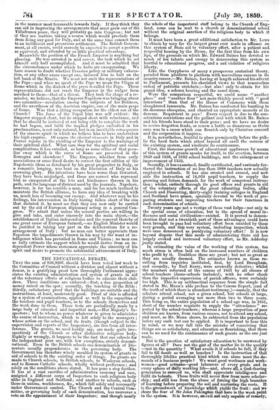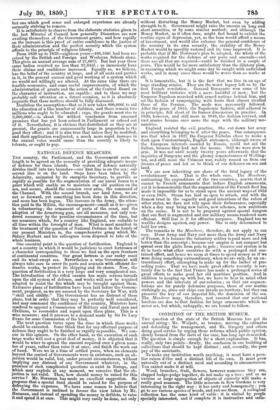THE EDUCATIONAL DEBATE.
THAT the sum of 836,920/. should have been voted last week to the Committee of Council without a division and almost without a demur, is a gratifying proof how thoroughly Parliament appre- ciates the existing administration and system of grants in aid of the voluntary efforts of religious bodies to educate their chil- dren. Three conditions are enforced—first, a due proportion of money raised on the spot ; secondly, the teaching of the Bible ; thirdly, satisfactory proof that the buildings are suitable and the instructions, at least, moderately good. Proof of this is afforded by a system of examinations, applied as well to the capacities of the teachers and pupil teachers, as to the schools themselves and the work done in them. These tests are periodically made by a large body of educated and impartial men,—Her Majesty's In- spectors; but to whom no power whatever is given to administer the course of instruction, which is left solely to the managers ; whose action on the school, and its fruits (though subject to the supervision and reports of the Inspectors), are free from all inter- ference. The grants, we need hardly say, are made quite irre- spectively of the Church or other distinctive religious body. Rightly or wrongly, it happens to be the fact that our schools for the independent poor are, with few exceptions, strictly denomi- national. Even in the British schools one denomination of Dis- senters usually preponderates in the governing body. The Government has therefore wisely moulded its system of grants in aid of schools to fit the existing order of things. Its grants are made to Church schools, to British schools, to Wesleyan schools, and to Roman Catholic schools, wholly without preference ; and. solely on the conditions above stated. It has gone a step further. It has at a vast sacrifice of administrative economy and ease, assigned a different corps of Inspectors to each religions body alike in England and Scotland; and another to schools such as those in unions, workhouses, &a., which fall solely and necessarily. under Government control. The Church and the Central Com- mittee, or governing body of each denomination, has moreover a veto on the appointment of their Inspectors; and though nearly
the whole of the inspectoral staff belong to the Church of Eng- land, none can be sent to a church or denominational school without the original sanction of the religious body to which it belongs. It must have been a great additional satisfaction to Mr. Lowe to obtain by very far the largest grant ever made in affiance on this system of State aid to voluntary effort, after a patient and respectful hearing by the House, for the first time from his own lips, of the grounds on which Mr. Edward Baines has devoted so much of his talents and energy to denouncing this system as hurtful to educational progress, and a sad violation of religious liberty. Like the Coryphceus of many a prosperous oratorical theory, paraded from platform to platform with marvellous success in its country career,—Mr. Baines, having at length achieved his advent to Parliament, presents his cherished views to that remorseless ordeal of "patriotic, crotchets ;—but alas! only to obtain for his grand idea, a solemn hearing and the usual doom. Were the comparison respectful, we could name "another place" and "another floor" not more thickly paved with "good intentions" than that of the House of Commons with these slaughtered innocents. Mr. Baines has conducted his bantling to its decorous obsequies, and chanted an appropriate monody at its decease. Requiescat in pace! Every respect is due to the con- scientious convictions and the gallant zeal with which Mr. Baines and his friends have stood to their guns ; and we have no desire to revive forgotten feuds, or renew a battle so disastrous as theirs once was to a cause which can flourish only by Christian concord and the cooperation it inspires.
It is, nevertheless, fruitful to place prominently- before the pub- lic the hard facts which attest beyond all cavil the success of the existing system, and vindicate its continuance.
First, the immense growth of educational appliances by means of this system of grants speaks for itself, in the erection, between 1839 and 1858, of 3182 school buildings, and the enlargement or improvement of 1352. -
Secondly, it has examined, finally certificated, and variously fur- thered the instruction of no less than 5888 teachers now actually employed in schools. It has also created and caused, and now aids the instruction of 14,024 pupil teachers, to supply the growing and future demands for the work of competent instruc- tion; whilst, entirely through its good offices and grants in aid. of the voluntary efforts of the great 'educating bodies alike Church and Dissenting, thirty-eight training colleges in England and Scotland have arisen, specially devoted to the work of pre- paring students and improving teachers for their functions in each denomination of schools.
Twenty years ago not a vestige of these vast helps—not only to the special cause of education, but to the spread of moral in- fluences and social civilization—existed. It is proved to demon- stration that not a twentieth part of these advantages could have been brought to pass had voluntary effort been unaided by these very grants, and this very system, including inspection, which were once denounced as paralyzing voluntary effort! It is now beyond dispute that this mode of administering State aid has largely evoked and increased voluntary effort, as Mr. Adderley justly stated. In estimating the value of the working of this system, too much stress is often laid on the increased numbers of children who profit by it. Doubtless these are great ; but not so great as they are usually deemed. The estimates known as those re- sulting from inquiries instituted, first, by Lord Brougham, and secondly, by Earl Kerry, were avowedly defective ; whilst the numbers returned at the census of 1851 by all classes of school-teachers (dame-schools included), with no other cheek than the imperfect supervision of parish officers, were certainly too high. This is an arithmetical sequence from the simple fad stated in Mr. Mann's able preface to the Census Report, (and of the truth of which there is abundant testimony,)—namely, that the scholars attend school, not a given school, but schools at large, during a period averaging not more than two to three years. This being so, the entire population of a school age was, in 1851, short of the number requisite to supply the "attendance" re- ported by the school-teachers; whereas a large proportion of poor children are known, from various causes not to attend. any school, and must, as Mr. Mann shows, be subtracted from the population before any such test can be applied. It is important to bear this in mind, or we may fall into the mistake of conceiving that things are so satisfactory, and education so flourishing, that there can be no need for the continuance of such grants as the one just made.
But is the question of satisfactory education to be answered by figures at all? Does not the gist of the matter lie in the quality —not in the quantity ? What avails it if schools be full, if they fail to fill heads as well as benches ? Is the instruction of that thoroughly lifelike practical kind which can alone meet the de- mands of a business people ? We want good workmen and work- women—good artisans—:is labourers of every grade and in every sphere of daily wor g life—and, above all, a God-fearing generation to succeed us' who shall appreciate intelligence and fulfil its behests. These fruits will never flow from mere scholar- ship; and still less from the abuse of forcing the high branches of learning before preparing the soil and nurturing the roots. It is the groundwork of knowledge which yields the fruit : and we share the fear of Sir John Pakurgion that here is the weak point in the system. It is however, kit evil not only capable of remedy,
but one which good sense and enlarged experience are already earnestly striving to remove. It is satisfactory to observe from the elaborate statistics given in the last Minutes of Council how generally Dissenters are now availing themselves of the Government grants, and how rapidly on the increase is this proof of entire confidence in the justice of their administration and the perfect security which the system affords to the principle of religious liberty.
From 1839 up to 1859—eighteen years-498,5561. had been re- ceived by the British and Foreign and Wesleyan Schools alone. This gives an annual average sum of 27,697/. But last year these same bodies received no less than 97,0451. • so immensely have their claims and confidence increased. Equally so, we believe, has the belief of the country at large, and of all sects and parties in it, in the general success and good working of a system which we would not willingly- see altered. At the same time there are feasible economies, and some useful improvements, of which the administration of grants and the action of the Central Board on the character of instruction, are capable ; and to these we may probably call attention on a future occasion, as it is absolutely requisite that these matters should be fully discussed. Doubtless the assumption—that as it now takes 800,000/. to aid the education of a like number of children' and there remain two millions who ought to be educated ; ergo, the grants must rise to 3,000,000/.—is about the wildest conclusion from unsound premises that has yet been coined in Parliament or echoed out of it. Nevertheless, it is obvious that distributed as they are at present, the grants are unnecessarily large in proportion to the good they effect ; and it is also true that unless they be modified, and their application readjusted, a much more rapid increase in the annual votes would ensue than the country is likely to tolerate, or ought to pay.



























 Previous page
Previous page